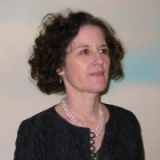Kathleen Wallace
| Birthname | Kathleen Wallace |
| Date of Birth | December 12, 1962 |
| Birth Place | Edinburgh, Scotland |
| Nationality | Scottish |
| Occupation | Professor |
| Biography | Professor of philosophy regarding ethics and metaphysics of persons. |
Kathleen (K.A) Wallace (born on December 12, 1962 in Edinburgh, Scotland) is a philosopher who focuses her work on ethics, anonymity, and the metaphysics of persons. Wallace has published countless articles and a few books, including her current project called "Relational Persons". Her views on Online Anonymity have changed and expanded the way people think of "anonymity" in virtual environments. K.A. Wallace is currently a Professor of Philosophy at Hofstra University.[1] Wallace and others that share her views continually try to answer the question of online ethics - specifically the comparison of human behavior online, and in real life.
Contents
Previous Administrative and Institutional Experience
- Department Chairperson (Hofstra University)
- Dean's Office Reviewer of Tenure and Promotion Files and Preparer of Tenure and *Promotion Recommendations (Hofstra University)
- Member of Task Force that developed proposal for establishing an Honors College (Hofstra University)
- Co-director (and member of founding committee) of interdisciplinary Women's Studies Program (Hofstra University)
- Member of Middle States Self-Assessment Staff (while completing the Ph.D. at SUNY at Stony Brook)[2]
Personal Interests
She enjoys[3]:
- The opera
- Visiting the New England area
- Traveling
- Bicycling
- Hiking
- Swimming
- Reading
Favorite Quote
"Even if you are on the right track, you'll get run over if you just sit there." -- Will Rogers[3]
Research Interests
K.A. Wallace works primarily on metaphysics and ethics at the intersection of contemporary analytic philosophy and feminism. She is currently working on the metaphysics of persons autonomy and responsibility.
She is also interested in bioethics, environmental ethics and sustainability, and in the ethical implications of technological developments. She wrote on the implications of digital and information technology with regard to conceptual issues like anonymity and practical issues like digital publishing and the long tail[3].
Current Professional Activity
Book Review Editor, Metaphilosophy
She is a fellow of the Center for Teaching and Scholarly Excellence, Hofstra University
Philosophy Projects
Her current project is "Relational Persons," on the metaphysics of persons, autonomy and responsibility. She has some other philosophical writings in ethics, Hume, metaphysics and American Philosophy. She wrote on the implications of digital and information technology with regard to conceptual issues like anonymity and practical issues like digital publishing and the long tail. In addition to philosophy, she conducts research on and written about faculty joint appointments and 3-credit course vs. 4-credit course curricula[3].
Relational Persons
She Believes relational persons are a work in progress.
Philosophers are drawn into analyses of persons and personal identity through different interests, an interest in practical concerns on the one hand, or an interest in the nature and identity of objects on the other. Among contemporary views of identity, the approach that she finds the most interesting is the temporal parts, or Wikipedia:Four_dimensionalism four dimensionalist theory, according to which a self is a temporal spread. Among contemporary practical concerns, for example, about the nature of agency, and autonomy among feminist philosophers, a general theme that emerges is the idea of a relational or intersectional self. The social view of the self arises from objections by feminists, communitarians and others to an atomistic view of the self that ignores the extent to which the self is a product of and constituted by its social relations and cultural or community locations. Four dimensionalism arises from problems in analytic metaphysics of identity of physical objects that change over and persist through time.
There two ideas that distill from the approach just mentioned. One is that of the self as a temporal spread and as relational to develop what she calls a relational process self. The self is a network of traits and a temporal spread. She has an expansive view of relations constitutive of a self and don't equate "relational self" solely with "social self." Rather, a self is relational throughout; it is a complex, relationally constituted process not just socially, but biologically, physically, psychologically, in every respect; relationality, complexity is "all the way down" or "all the way up," whichever perspective one wants to take. She argues the approach to a relational process self can avoid some of the problems attributed to a view of the self as a "social self," namely that it lacks individuality, agency, and uniqueness. Her goal is to present a plausible approach to understanding selves, an approach that is able to connect up with characteristic functions, capacities, and experiences of selves. A self changes, has a history or biography, is capable of agency, autonomy and responsibility, has the capacity for communication and perspective-taking, and for internalizing social and cultural roles and values in ways that do not necessarily undermine autonomy. At the same time, her view will address some of the traditional philosophical puzzles about identity, continuity and persistence[3].
Education
K.A. Wallace achieved her Ph.D. in Philosophy from Stony Brook University. She wrote her dissertation on the ontology of George Santayana. She has wrote on other topics such as ordinal metaphysics, Hume, feminism, and ethics[3].
Major Contributions
She has played a part in defining Online Anonymity. She adds to the Concept of what it means to be autonomous. She brings up Anonymity and ethical issues in information technology from the points of data mining, tracking, and that users presumption of anonymity. She adds and supports the globalization of online activitly saying that "Online communication and self-expression may facilitate forms of interaction that could be beneficial to human and cultural experience, albeit in different ways and in different respects." She points out issues with Identity theft[3].
References
- ↑ "Kathleen Wallace"., Academia., retrieved April 22, 2019., http://hofstra.academia.edu/KAWallace
- ↑ "Kathleen Wallace, Institutional Research"., retrieved April 22, 2019., http://www.kathwallace.com/institution.html
- ↑ 3.0 3.1 3.2 3.3 3.4 3.5 3.6 "Kathleen Wallace"., retrieved April 22, 2019., http://www.kathwallace.com/index.html

